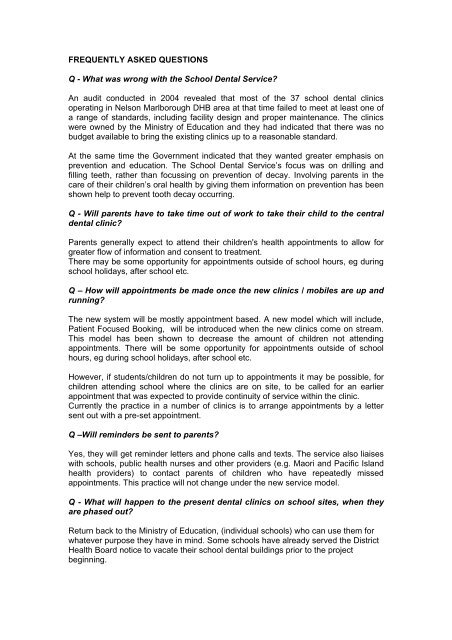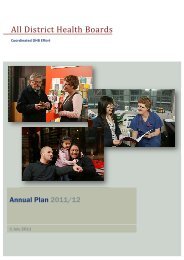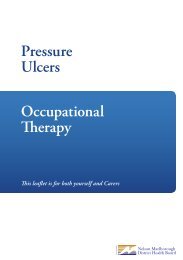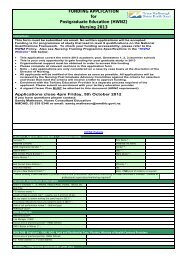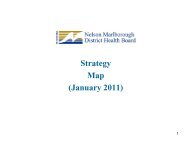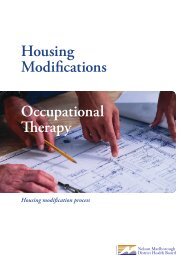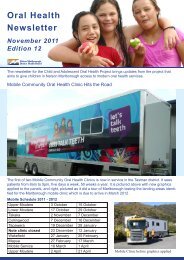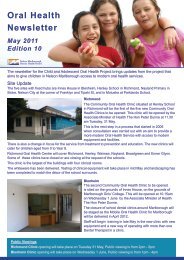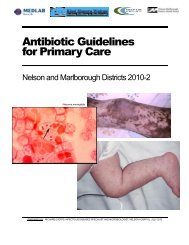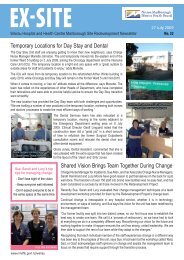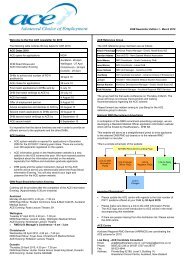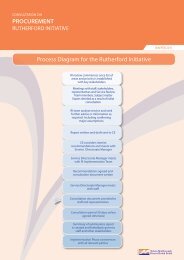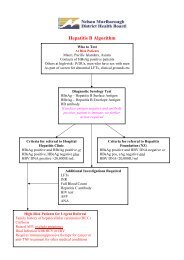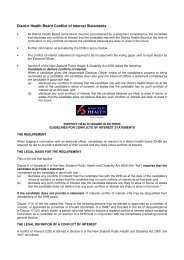frequently asked questions - Nelson Marlborough District Health Board
frequently asked questions - Nelson Marlborough District Health Board
frequently asked questions - Nelson Marlborough District Health Board
You also want an ePaper? Increase the reach of your titles
YUMPU automatically turns print PDFs into web optimized ePapers that Google loves.
FREQUENTLY ASKED QUESTIONS<br />
Q - What was wrong with the School Dental Service?<br />
An audit conducted in 2004 revealed that most of the 37 school dental clinics<br />
operating in <strong>Nelson</strong> <strong>Marlborough</strong> DHB area at that time failed to meet at least one of<br />
a range of standards, including facility design and proper maintenance. The clinics<br />
were owned by the Ministry of Education and they had indicated that there was no<br />
budget available to bring the existing clinics up to a reasonable standard.<br />
At the same time the Government indicated that they wanted greater emphasis on<br />
prevention and education. The School Dental Service’s focus was on drilling and<br />
filling teeth, rather than focussing on prevention of decay. Involving parents in the<br />
care of their children’s oral health by giving them information on prevention has been<br />
shown help to prevent tooth decay occurring.<br />
Q - Will parents have to take time out of work to take their child to the central<br />
dental clinic?<br />
Parents generally expect to attend their children's health appointments to allow for<br />
greater flow of information and consent to treatment.<br />
There may be some opportunity for appointments outside of school hours, eg during<br />
school holidays, after school etc.<br />
Q – How will appointments be made once the new clinics / mobiles are up and<br />
running?<br />
The new system will be mostly appointment based. A new model which will include,<br />
Patient Focused Booking, will be introduced when the new clinics come on stream.<br />
This model has been shown to decrease the amount of children not attending<br />
appointments. There will be some opportunity for appointments outside of school<br />
hours, eg during school holidays, after school etc.<br />
However, if students/children do not turn up to appointments it may be possible, for<br />
children attending school where the clinics are on site, to be called for an earlier<br />
appointment that was expected to provide continuity of service within the clinic.<br />
Currently the practice in a number of clinics is to arrange appointments by a letter<br />
sent out with a pre-set appointment.<br />
Q –Will reminders be sent to parents?<br />
Yes, they will get reminder letters and phone calls and texts. The service also liaises<br />
with schools, public health nurses and other providers (e.g. Maori and Pacific Island<br />
health providers) to contact parents of children who have repeatedly missed<br />
appointments. This practice will not change under the new service model.<br />
Q - What will happen to the present dental clinics on school sites, when they<br />
are phased out?<br />
Return back to the Ministry of Education, (individual schools) who can use them for<br />
whatever purpose they have in mind. Some schools have already served the <strong>District</strong><br />
<strong>Health</strong> <strong>Board</strong> notice to vacate their school dental buildings prior to the project<br />
beginning.
Q - Where will the 5 large dental clinics be positioned?<br />
Fixed clinic sites have been confirmed, Henley School (Richmond) and Parklands<br />
School (Motueka), Nayland School (Stoke), Innes House (Blenheim) and on the<br />
<strong>Nelson</strong> <strong>Marlborough</strong> DHB site in Franklyn St (<strong>Nelson</strong>). Those clinics in school<br />
grounds are on DHB leased areas with car parking provided for parents.<br />
Q - Does this mean less Oral <strong>Health</strong> Service for rural schools?<br />
Possibly more with the trailer visiting schools every 6 months – ie Havelock who do<br />
not currently have a clinic will receive visits from the mobile clinic.<br />
Q – This change is going to make it harder for some parents to get to a clinic –<br />
how are they going to ensure their children receive dental treatment?<br />
The most positive aspect of the change is that parents will now have a greater<br />
opportunity to be involved in the oral health care of their children.<br />
All the clinics will have flexible opening hours that fit in with working and non-working<br />
parents. Parents will also be able to pre-book appointments to suit their family’s<br />
schedule. This will make the service easier to access for children requiring acute<br />
care or those that miss appointments. Under the current system dental therapists<br />
move from school to school, often only staying a few weeks at each school, this<br />
sometimes makes it difficult for parents to know where to access the service when<br />
they need it.<br />
Q – How far will people have to travel to get to a clinic?<br />
Irrespective of where they live most parents will be required to transport their children<br />
to a clinic, just as they would when taking their child to the doctor. In <strong>Nelson</strong><br />
<strong>Marlborough</strong> DHB area it is envisaged that travel will be no more than ten minutes by<br />
car in the town/city areas; Currently almost 70% of school children travel with<br />
appointments to clinics with their parents.<br />
Q – How much consultation did <strong>Nelson</strong> <strong>Marlborough</strong> DHB undertake before it<br />
made this decision?<br />
The change to the School Dental Service model was developed in response to the<br />
Minister of <strong>Health</strong>’s vision for oral health in New Zealand, described in ‘Good oral<br />
health for all, for life: The Strategic Vision of Oral <strong>Health</strong> in New Zealand (2006).’<br />
In 2006 letters and questionnaires were sent to schools in the region seeking input<br />
into the development of a new oral health service. The suggestions were varied but<br />
reflected the themes, which were incorporated into the final proposal.<br />
Q - Will this model save money for the DHB in the long run?<br />
No the increase in operating costs has been included in the <strong>District</strong> Annual Plan and<br />
committed to by the Ministry of <strong>Health</strong>.<br />
Q – How were decisions made about which schools will be visited by a mobile<br />
clinic?<br />
The mobile clinics in <strong>Marlborough</strong> and Tasman will predominately visit rural schools
that have had a dental clinic or schools that have a suitable number of students and<br />
are en-route to the schools with clinics;<br />
The overall service configuration for <strong>Nelson</strong> <strong>Marlborough</strong> was arrived at after<br />
carefully balancing the issues of community need, geography, socio-economic<br />
factors, quality of care, and the clinical and economic sustainability of the service.<br />
Q – Why don’t mobile clinics visit every school?<br />
Taking a mobile to every school was considered during the planning process. There<br />
are several major disadvantages with this approach:<br />
- The cost of installing concrete pads and associated power, water and drainage<br />
connections needed by the mobile clinics at every school would be prohibitive<br />
- Each move from one site to the next results in at least one day of lost productivity<br />
for the mobile clinic. Visiting every school in <strong>Nelson</strong> <strong>Marlborough</strong> would result in the<br />
equivalent of one mobile clinic being effectively out of service over half of the time<br />
and the cost of the relocation each time it was moved.<br />
- It would require a further purchase of 8 mobile units whose cost would be<br />
prohibitive. Additionally this would not achieve the supportive environment for DHB<br />
staff.<br />
- Fixed clinics are an important element to maintaining a comprehensive service and<br />
rely on the children using those services to remain viable. They will offer year round<br />
care from a known location, making it easier for parents to find when relief of pain<br />
services are required for their children, or when appointments at mobile clinics are<br />
missed though illness. More advanced services are also able to be offered in multichair<br />
fixed facilities, which would not be possible from a service made up solely of<br />
mobile clinics.<br />
Q - Will any staff be made redundant from the change of model?<br />
The model that the Oral <strong>Health</strong> Project is working towards will require more Full Time<br />
Equivalent Staff than the previous model.<br />
Q – Are there any changes to dental care for adolescents?<br />
<strong>Nelson</strong> <strong>Marlborough</strong> DHB currently contracts with private dentists to provide free<br />
adolescent services. This will not change under the new model<br />
From Year 9 most children will be expected to enrol with a DHB-contracted private<br />
dentist to continue receiving free dental care. During Year 8 they will receive a<br />
transfer form to enrol with a private dentist, if one is available in their area.<br />
Q – What dental care is free?<br />
Most dental care is free for children under 18. There are some exceptions though,<br />
such as orthodontics (braces), other private specialist care and tooth whitening. To<br />
find out more, see: http://www.moh.govt.nz/moh.nsf/indexmh/oralhealth-teenage
Q – What is the timeframe for closing down the school clinics and moving to<br />
the purpose-built clinics?<br />
The DHB needs to work through new leasing requirements, building consent and<br />
construction contracts for each site and take delivery of the mobile clinics before<br />
closing current clinics.<br />
All works are expected be completed by mid 2011 we will phase the work to close<br />
clinics.<br />
Q – Where can I get further information about Good oral health for all, for life?<br />
Go to : - http://www.moh.govt.nz/moh.nsf/pagesmh/5117/$File/good-oral-healthstrategic-vision-2006.pdf


